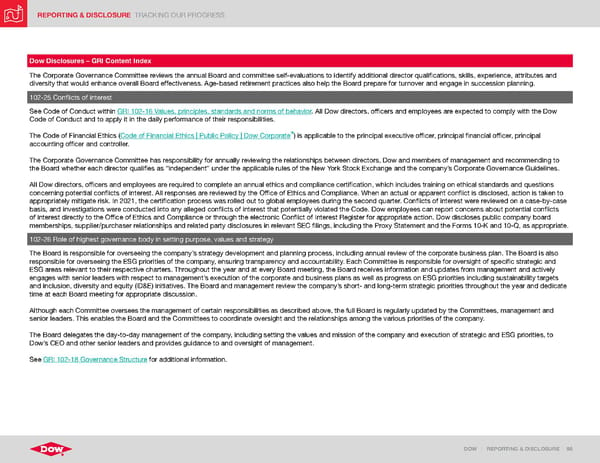REPORTING & DISCLOSURE TRACKING OUR PROGRESS DOW | REPORTING & DISCLOSURE | 98 Dow Disclosures – GRI Content Index The Corporate Governance Committee reviews the annual Board and committee self-evaluations to identify additional director qualifications, skills, experience, attributes and diversity that would enhance overall Board effectiveness. Age-based retirement practices also help the Board prepare for turnover and engage in succession planning. 102-25 Conflicts of interest See Code of Conduct within GRI 102-16 Values, principles, standards and norms of behavior . All Dow directors, officers and employees are expected to comply with the Dow Code of Conduct and to apply it in the daily performance of their responsibilities. The Code of Financial Ethics ( Code of Financial Ethics | Public Policy | Dow Corporate ) is applicable to the principal executive officer, principal financial officer, principal accounting officer and controller. The Corporate Governance Committee has responsibility for annually reviewing the relationships between directors, Dow and members of management and recommending to the Board whether each director qualifies as “independent” under the applicable rules of the New York Stock Exchange and the company’s Corporate Governance Guidelines. All Dow directors, officers and employees are required to complete an annual ethics and compliance certification, which includes training on ethical standards and questions concerning potential conflicts of interest. All responses are reviewed by the Office of Ethics and Compliance. When an actual or apparent conflict is disclosed, action is taken to appropriately mitigate risk. In 2021, the certification process was rolled out to global employees during the second quarter. Conflicts of interest were reviewed on a case-by-case basis, and investigations were conducted into any alleged conflicts of interest that potentially violated the Code. Dow employees can report concerns about potential conflicts of interest directly to the Office of Ethics and Compliance or through the electronic Conflict of Interest Register for appropriate action. Dow discloses public company board memberships, supplier/purchaser relationships and related party disclosures in relevant SEC filings, including the Proxy Statement and the Forms 10-K and 10-Q, as appropriate. 102-26 Role of highest governance body in setting purpose, values and strategy The Board is responsible for overseeing the company’s strategy development and planning process, including annual review of the corporate business plan. The Board is also responsible for overseeing the ESG priorities of the company, ensuring transparency and accountability. Each Committee is responsible for oversight of specific strategic and ESG areas relevant to their respective charters. Throughout the year and at every Board meeting, the Board receives information and updates from management and actively engages with senior leaders with respect to management’s execution of the corporate and business plans as well as progress on ESG priorities including sustainability targets and inclusion, diversity and equity (ID&E) initiatives. The Board and management review the company’s short- and long-term strategic priorities throughout the year and dedicate time at each Board meeting for appropriate discussion. Although each Committee oversees the management of certain responsibilities as described above, the full Board is regularly updated by the Committees, management and senior leaders. This enables the Board and the Committees to coordinate oversight and the relationships among the various priorities of the company. The Board delegates the day-to-day management of the company, including setting the values and mission of the company and execution of strategic and ESG priorities, to Dow’s CEO and other senior leaders and provides guidance to and oversight of management. See GRI 102-18 Governance Structure for additional information.
 ESG Report | Dow Page 97 Page 99
ESG Report | Dow Page 97 Page 99